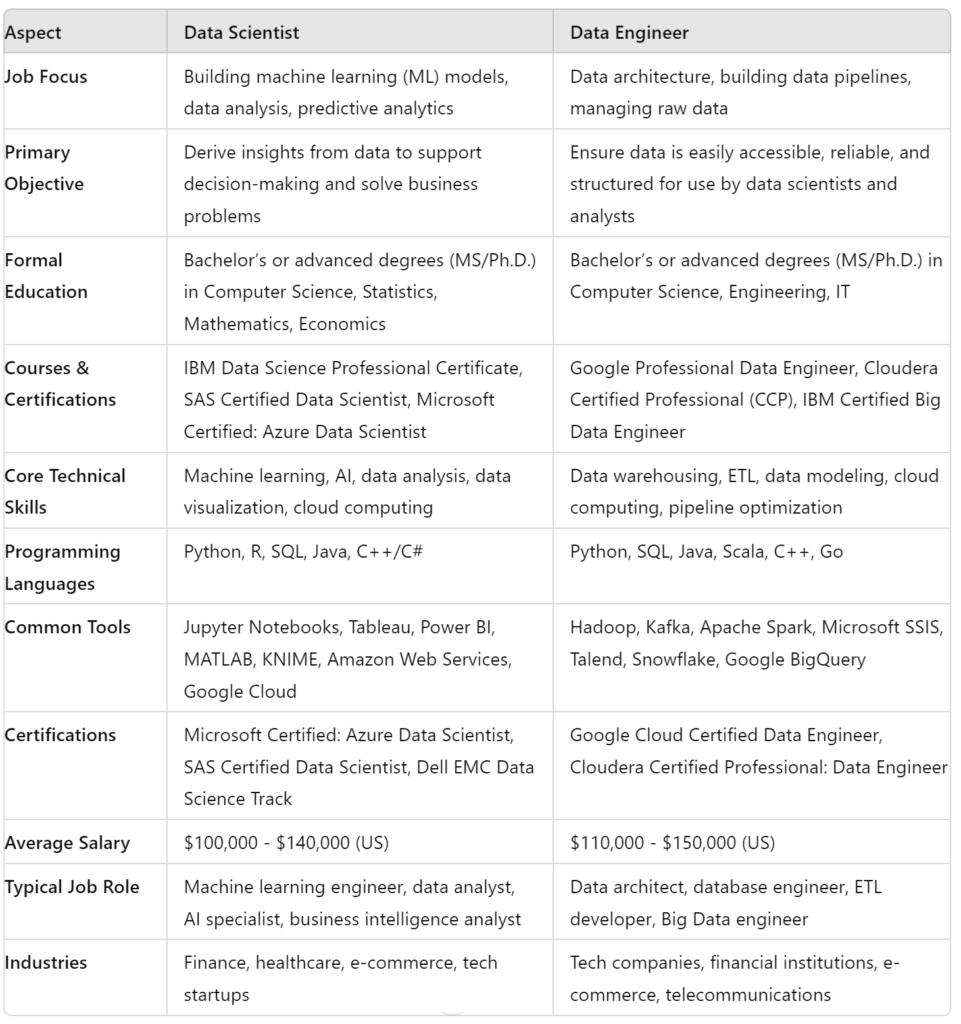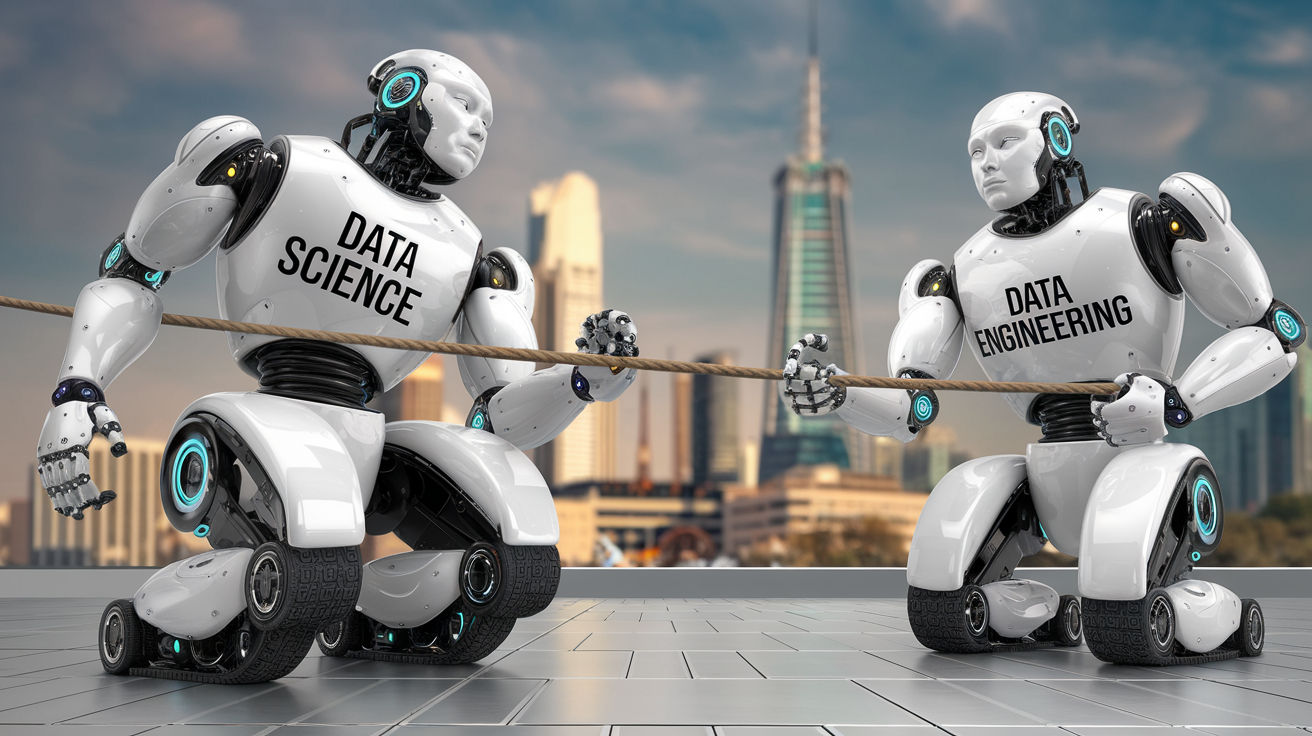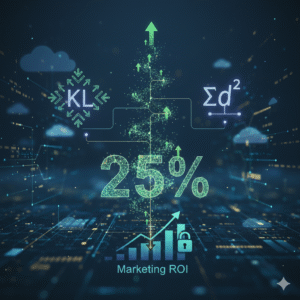In today’s data-driven world, the demand for data experts has skyrocketed. However, understanding which data career path is right for you can be daunting. Two of the most sought-after roles are data scientists and data engineers. While both positions deal with data, their responsibilities, skillsets, and career outlooks differ significantly.
Wondering how to choose between data science and data engineering?
In this comprehensive guide, we’ll delve into the similarities and differences between these two roles. We’ll explore the skills, education, certifications, programming languages, tools, and even potential salaries that differentiate data scientists from data engineers. By the end of this blog, you’ll have the knowledge you need to make a well-informed career decision.
1. Understanding the Job Focus: What Do They Actually Do?
Data Scientist: Building Machine Learning Models
A data scientist is primarily responsible for analyzing data, creating machine learning (ML) models, and generating insights. Their goal is to derive meaningful conclusions from raw data to help businesses make data-driven decisions. A typical day in the life of a data scientist might involve:
Identifying business challenges that can be solved with data.
Cleaning and preprocessing data to ensure its quality.
Applying statistical models, algorithms, or ML to extract insights.
Communicating these insights to stakeholders through data visualizations.
👉 Example Scenario:
Imagine a retail company struggling with customer churn. A data scientist is tasked with building a predictive model to identify which customers are likely to stop purchasing, allowing the marketing team to take action before it’s too late.
Data Engineer: Data Architecture and Raw Data Management
On the other hand, a data engineer focuses on the architecture, construction, and optimization of systems that allow raw data to be processed efficiently. They create and manage pipelines that move data from various sources to storage and analysis platforms. Key tasks for a data engineer include:
Designing and maintaining databases and data storage solutions.
Building efficient data pipelines that ensure the smooth flow of data.
Optimizing data retrieval and processing times.
Collaborating with data scientists to provide high-quality, structured data for analysis.
👉 Example Scenario:
A data engineer working for a financial institution may develop and optimize a pipeline that aggregates data from stock markets, processes it in real time, and makes it available to data scientists for real-time analysis and decision-making.

2. Formal Education: What Degrees and Certifications Do You Need?
Data Scientist: Advanced Mathematical and Statistical Background
If you’re aiming to become a data scientist, most companies require at least a Bachelor’s degree in a related field like:
Computer Science
Statistics
Mathematics
Engineering
Economics
Many data scientists hold advanced degrees (Master’s or Ph.D.), especially if they focus on research-based roles. In addition to formal education, some key certifications can include:
IBM Data Science Professional Certificate
Microsoft Certified: Azure Data Scientist Associate
SAS Certified Data Scientist
Data Engineer: Focus on Software and Database Design
A Bachelor’s degree in fields like Computer Science, IT, or Engineering is commonly required for data engineers. Since they work heavily with database management and data pipeline optimization, practical skills in ETL (Extract, Transform, Load) processes are essential.
Certifications that can benefit aspiring data engineers include:
Google Professional Data Engineer
Cloudera Certified Professional (CCP): Data Engineer
IBM Certified Data Engineer – Big Data
Pro Tip: Obtaining certifications in cloud platforms like AWS, Azure, or Google Cloud is a huge plus for both data scientists and data engineers, as cloud infrastructure is widely used in data handling.
3. Skills: Which Technical Skills Set You Apart?
Data Scientist: Machine Learning, AI, and Data Analysis
Data scientists need a wide array of technical skills to succeed. Some of the most in-demand abilities include:
Programming: Python, R, JavaScript, SQL
Machine Learning & AI: Developing predictive models, supervised and unsupervised learning, neural networks
Data Analysis & Visualization: Using tools like Tableau, Power BI, or Jupyter Notebooks
Cloud Computing: Experience with platforms like AWS or Google Cloud
APIs & Automation: Efficient use of APIs to interact with large datasets and automating repetitive tasks
Data Engineer: Data Warehousing, ETL, and Pipeline Optimization
In contrast, data engineers are the backbone of data infrastructure. Key technical skills include:
Database Management: Working with SQL, NoSQL (e.g., MongoDB, Cassandra)
Data Pipeline Development: Strong skills in ETL/ELT systems for gathering, transforming, and loading data into warehouses
Programming: Strong knowledge in Python, Scala, Go, SQL
Cloud Infrastructure & Storage: Familiarity with Snowflake, AWS, Azure, Google Cloud
Big Data Technologies: Experience with Hadoop, Kafka, Spark, and Hive
Both roles require statistics and mathematics as a foundational skillset, but how they apply these skills in their jobs differs. While data scientists use statistical methods to interpret data, data engineers leverage statistics to ensure efficient database performance.
4. Programming Languages: Python and SQL Rule the Roost
Whether you choose to pursue a career as a data scientist or a data engineer, you will need to master programming languages. Here’s a quick breakdown:
Python: Universally popular in both data science and data engineering for its ease of use and extensive libraries.
SQL: Vital for managing and querying relational databases.
R: Primarily used by data scientists for statistical analysis.
Java/JavaScript/C++: Useful in both fields but more commonly seen in data engineering for application development.
Scala and Go: Gaining traction in the data engineering world, especially for handling large-scale data processing.
5. Tools: Which Platforms and Software Will You Use Daily?
Data Scientist Tools:
-
Data science platforms like Jupyter Notebooks, KNIME, MATLAB.
-
BI tools such as Tableau, Power BI, Looker for creating data visualizations.
-
Cloud databases and storage like Amazon Web Services (AWS), Google Cloud, Microsoft Azure.
Data Engineer Tools:
ETL tools like Microsoft SSIS, Talend, Apache NiFi.
Big Data tools like Hadoop, Kafka, Spark.
Cloud data warehouses like Snowflake and Google BigQuery.
6. Salaries: What Can You Expect to Earn?
Salary expectations vary between the two fields based on region, experience, and specialization.
Data Scientist Salary: On average, a data scientist in the U.S. can expect to earn between $100,000 and $140,000 annually. Specialized roles in machine learning or AI can earn even more.
Data Engineer Salary: Data engineers tend to earn slightly more, with averages ranging between $110,000 and $150,000 annually, especially those working with Big Data or cloud technologies.
7. Real-World Case Studies: How Companies Use Data Scientists and Data Engineers Together
In many organizations, data scientists and data engineers work together to drive data-centric decision-making.
Case Study 1: Airbnb
Airbnb uses data scientists to develop machine learning algorithms that predict pricing and demand for its listings. Meanwhile, data engineers ensure that all the data Airbnb collects from hosts, guests, and properties is clean, reliable, and easily accessible for the data science team.
Case Study 2: Netflix
Netflix uses data engineers to handle the massive influx of user data from streaming activities. Data scientists use this data to build recommendation systems that suggest shows and movies to users, improving customer satisfaction and engagement.
Conclusion: Data Science vs Data Engineering – Which Path Should You Choose?
When deciding between data science and data engineering, consider your strengths and interests:
If you love data modeling, machine learning, and data visualization, a career in data science might be for you.
If you enjoy building databases, optimizing data flow, and working with big data infrastructure, data engineering could be a better fit.
Pro Tip:
When deciding between data science and data engineering, consider your strengths and interests:
If you love data modeling, machine learning, and data visualization, a career in data science might be for you.
If you enjoy building databases, optimizing data flow, and working with big data infrastructure, data engineering could be a better fit.
Final Thoughts
We hope this guide has helped you better understand how to choose between data science and data engineering. Both careers offer exciting opportunities in the world of data, but selecting the one that aligns with your goals, skills, and passions will be key to your long-term success!


















